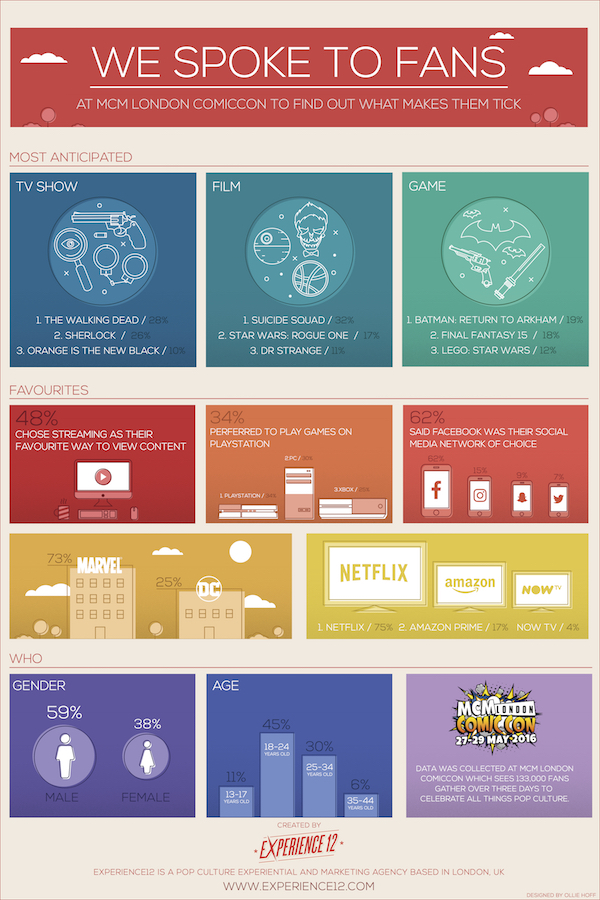
The death of Film? Not according to Comic Con fans
Despite the rise of comic book based TV shows being released, 72% of MCM London Comic Con audiences still prefer film.
With the rise of long-form TV shows, it is easy to see why audiences and critics may predict a new golden age of episodic television whilst film dies a lonely death in increasingly empty cinemas. According to a survey taken by experiential marketing agency Experience12, however, this is certainly not the case for Comic Con audiences, with almost three quarters preferring watching films to TV shows.
Despite garnering growing audiences, TV comic book adaptations are often exclusive to one streaming platform, limiting their audience and making it difficult to rival the superhero film movement that has irrevocably changed cinema. Ever since Sam Raimi’s Spiderman in 2002, film producers have learnt how to tell human stories through superhero protagonists. Combine this with the incredible technology that now exists to bring comic book storylines to life; it is easy to see how comic book culture has taken over Hollywood.
The growing popularity of these films signifies that geek culture is now not only mainstream but also cool. Three of the top worldwide grossing films of all time are based on comic books and at MCM London Comic Con 35% of audiences cosplayed films compared to just 13% who cosplayed TV characters.
The unwavering loyalty of these fans to film reflects the content on display at the MCM London Comic Con show. Most of the major film studios such as Universal and Warner Bros have a significant presence at the show offering fans exclusive content and engaging activations. TV brands, on the other hand, are only recently taking notice of the substantial value of the ‘geek pound’. Brands such as Fox TV, who have pioneered a presence at the show, have seen the numerous benefits. Its presence at London Comic Con has now become a central focus in launching shows such as The Walking Dead and its latest comic book adaption of Robert Kirkman’s Outcast.
What these brands have recognised is that MCM London’s Comic Con audiences are made up of the most engaged and passionate film and TV fans in Europe. On demand services such as Netflix and Amazon Prime, are investing millions to produce original adaptations of popular comics to target these exact audiences, yet are only recently identifying the opportunity to put these shows in front of 130,000+ fans all in one place.
Netflix, in particular, has reaped the benefits of creating original Marvel adaptations like Daredevil and Jessica Jones. 75% of Comic Con audiences chose Netflix as their favourite streaming service, compared to 17% for Amazon Prime and 4% for Now TV. This is a huge market lead in such a relevant sector, especially considering that 48% of this audience favour on-demand services when viewing TV content.
Despite its position as market leader, Netflix is yet to consolidate the loyalty of fans by engaging with them directly at events such as MCM London Comic Con, an oversight that Amazon Prime has spotted and is exploiting in order to establish itself within this space and gain further market share.
At MCM London’s May 2016 Comic Con Amazon Prime launched its latest DC Vertigo comic adaptation, Preacher, with an imposing 7m tall church, offering fans access to exclusive content and takeaways, resulting in 1,000’s of people passing through the church over the three-day event.
Gary Burns, European head of PR and content development at MCM London Comic Con commented,
“Movies have a special place in the hearts and minds of our audience, as does the whole cinema-going experience. There’s a fundamentally different dynamic involved when you compare sitting at home to watch Daredevil on Netflix or going to the cinema to check out Deadpool.
However, we are definitely entering a ‘golden age’ in TV, where the gap between the way movies and TV shows are made is closing; in terms of budgets, production values and available acting talent. Already in 2016 Game of Thrones has aired one of, if not the, most expensive, film worthy TV episodes of all time and Amazon Prime has announced it will invest billions into its video content push. This willingness to make such huge investments is not only a precursor of how big TV is set to be but also a trend that will no doubt continue.”
See the full infographic below!
Infographic provided by www.experience12.com

